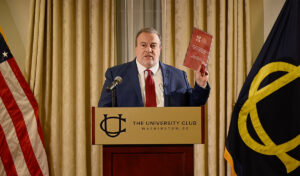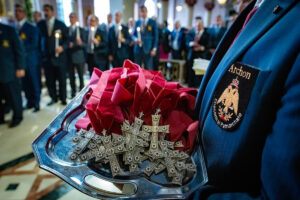This exhaustive report documents many instances of what we have chronicled at this site many times as well: Hindu extremists see Christianity as an alien and unwelcome element in India, heedless of the fact that Christianity was brought to India in the first century by St. Thomas the Apostle. There still exist Christian communities in India that trace their episcopal lineage back to St. Thomas. The Hindu nationalist rage against Christianity is based either upon ignorance of this history or a deliberate attempt to obliterate it.
“How Hindu Extremists Are Shutting Down Christian Churches: ‘Why Are You Worshipping a Foreign God?,'” by Surinder Kaur Lal and M. Clark, Newsweek, March 26, 2019:
A year ago on Feb. 18, about 80 Christians shuffled into Almighty God Church inside their pastor G. Pughal’s house in Kodumudi, Erode District, Tamil Nadu, India, for Sunday prayers. Men in simple collared shirts and trousers and women wrapped in purple, red and blue cotton floral saris, with fragrant jasmine flowers tucked into their braids, held squirmy children on their laps.
Outside, one of the south’s most active Hindu extremist groups, the Hindu Munnani, held a rally. More than 100 people waving saffron orange flags shouted slogans like, “India belongs to only Hindus, not to any other!”
The families prayed in Tamil, a South Indian language, their voices competing with the approaching chants outside and a spinning ceiling fan, until a group of 15-20 Hindu fundamentalists – some just teenagers – threw open the blue metal door and shouted at the pastor standing at the pulpit.
In the tone of a police officer investigating a drug pin, they demanded written proof of the local government’s approval, which Pughal did not have, he said.
“They were saying, ‘You all mostly have Hindu names,’” Pughal said. “’You all are Hindus, so why are you worshipping a foreign god?’”
The independent ministry had been hosting prayer meetings for 17 years.
“All I was thinking was that I didn’t do anything wrong,” he said. “Indian law gives me freedom to preach my faith, and that’s what I’m doing.”
A shift from violence to leveraging laws
The media has widely reported a 28 percent rise in religious and often violent hate crimes in India by Hindu extremist groups since Prime Minister Narendra Modi’s Hindu nationalist Bharatiya Janata Party (BJP) won national election in 2014 to 2017, though some dispute whether the reports have merely corresponded with a rise in digital media outlets and interest in that topic, particularly violence against Muslims. But even with reports on bloodshed (like this one of 25 violent attacks just over the Christmas holiday), persecution of Indian Christians has largely remained in fringe Christian media. Only 2.3 percent of the country is Christian, according to a 2011 census—that equates to 28 million people in the world’s largest democracy.
Religion Unplugged spoke to 26 pastors, laypeople, lawyers and activists from five states who say that though violent threats to their religious freedoms are the norm, Hindu fundamentalist groups have shifted their strategy from violence to a more coordinated effort to use building regulation laws to shut down churches, especially in remote areas.
“The government has now smartened up,” Michael Williams, president of the United Christian Forum (UCF), which runs a helpline for Christians facing threats, said. “As opposed to beating people with a stick, which they still do, the government is changing the way they enforce policies now.”
Although the right to assemble is a fundamental right, the right to conduct a religious service is not. Neighbors have the right to complain to police about religious services conducted in a residential building, though Hindu family prayers in the home are norms for certain festivals, and noisy street processions and early morning calls to prayer from loudspeaker towers are common.
“Hindus are purposely gathering to exert some of these rights,” Williams said. “Some of these rights are stretching the law, reaching, but there is a toehold they have found.”
In the first 31 days of 2019, a UCF helpline recorded 29 incidents of violence and threats toward Christians nationally compared to an average 20 incidents per month last year.
Pughal called the UCF helpline and received free legal advice and a lawyer to challenge the church’s ban. A year later, the church’s case is still proceeding in the lower court.
More than 100 churches shut in 2018
In Tamil Nadu, a 1972 building code and 1994 panchayat (local self-rule) building rules require local government approval to build a structure used for public worship or religious purposes, and approval can be denied if the government believes public peace and order will be disrupted. It’s less clear how the law should handle worshippers gathered in a home.
India’s left-wing party, Congress, introduced similar laws in other states, Madhya Pradesh and Rajasthan, and in 2000, the right-wing BJP state government passed the same laws in Uttar Pradesh, the country’s most populous state. Under these laws, local governments can regulate the use of buildings by religious groups and require permissions for religious activities. The BJP regained power over the state with the 2017 election of the Hindu monk Yogi Adityanath, who promised to build a Hindu temple on the same land as the ruins of a 16 th century mosque destroyed by Hindu fundamentalists in 1992.
In 2018, at least 55 churches in Uttar Pradesh, 25 in neighboring Uttarakhand, and 19 in Tamil Nadu have been closed after Hindu fundamentalists raided them or filed complaints with police, according to UCF helpline reports and Alliance Defending Freedom (ADF), a US-based non-profit that provides legal aid to defend religious freedom of Christians. Some had congregations as many as 300 people. These church counts are bare minimums, as pastors in the areas insist that there are too many and in remote places to keep accurate records.
Mange Singh, from Ruhalki Kishanpur near Haridwar, has helped coordinate house churches in 85 villages across the Himalayan foothills in Uttarakhand and said the police have closed seven churches permanently.
“The Hindu extremists barge into the middle of the worship services and threaten and abuse the people present,” Singh said. “If this does not scare the Christians away, the extremists get the police along and shut down the church and the fellowship by force and chase the worshippers away.”
Singh’s church, Christian Revival Church, has been attacked at least 25 times by Hindu extremists groups since it began in 2010. Instead of arresting the attackers, the police usually arrest a pastor. Singh has been arrested 32 times since 2011 over conducting prayers or false allegations of forcibly converting someone to Christianity, he said.
Just last month on Jan. 16, a Hindu mob harassed and beat one of Singh’s church members. In a 2018 annual report, the Indian organization Persecution Relief recorded 129 attacks against Christians in Uttar Pradesh alone, the highest number among the 29 states of India.
“Since 2014, persecution has increased,” Singh said, calling the past few years “Persecution Anytime”.
Rajesh Kumar, a pastor from Sultanpur in Uttar Pradesh, led a church of 300 members that met in his own house for the last 10 years until 2018, when members of the Bajrang Dal disrupted their fellowship. The Bajrang Dal is a Hindu extremist group formed in 1984, presently based in Delhi and a member of the Rashtriya Swayamsevak Sangh (RSS), a paramilitary organization that’s the ideological parent and grassroots arm of the BJP. The US’ CIA labeled the Bajrang a “militant religious organization” and the RSS a “nationalist organization” in its 2018 world factbook.
“They took us to the police station and an FIR [First Information Report] was lodged against us for ‘disrupting peace,’” Bhawar Pal Singh, an elder of Kumar’s church and not related to Mange Singh, said….






